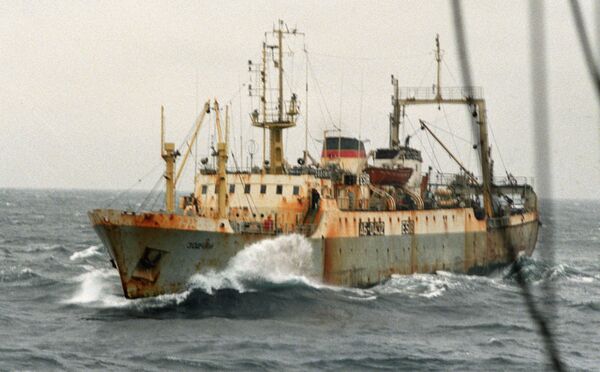On March 12, Pete Bethune, captain of the Ady Gil, an anti-whaling boat belonging to the Sea Shepherd Conservation Society, was arrested for illegally boarding a Japanese ship.
The arrest was the logical outcome of Western environmentalists' war against Japanese whalers in the Antarctic this season.
The Ady Gil collided with the Japanese whaling security ship Shonan Maru No. 2 in January. Later the environmentalists threw bottles of butyric acid at the whaling ship Yushin Maru No. 3. Japan claims three crewmembers were injured in the attack.
Several days later, Captain Bethune jumped aboard the Shonan Maru No. 2 from a jet ski with the goal of making a citizen's arrest of the ship's captain and presenting him with a $3 million bill for the destruction of the Ady Gil.
He was taken into custody by the ship's crew for trespassing and assault on March 12.
Japanese research vessels manage to hunt hundreds of mostly minke whales - which are not endangered - in the Antarctic each year because of a loophole in the International Whaling Commission's 1986 ban on commercial whaling that allows the taking of whales for research. Whale meat not used for study is sold for consumption in Japan, which critics say is the real reason for the hunts.
The environmentalists, who maintain that whaling is immoral, have been using increasingly extravagant methods to fight Japanese whalers. However, it is not clear why the Japanese are fighting back so fiercely, even ramming the Ady Gil vessel. Whale meat is now very rarely sold in Japan.
For Japan, whales, dolphins and tuna fish are part of a broader problem. While no one has dared to say so, the Japanese view attempts to stop them from eating whale meat as a Western infringement on Japanese culture. They have always hunted whales, and whale meat was an integral part of the Japanese diet just a few decades ago. It could be found on school lunch menus, because whale meat is cheap and nourishing.
The law-abiding Japanese respect the international ban on whale hunting, but regard Sea Shepherd's attacks as violent extremism.
When the environmentalists say that whales must not be hunted because they are mammals, the Japanese argue back that beef and pork should also be prohibited in that case. When the environmentalists say that whales are endangered animals, the Japanese counter that they became endangered because the West had systematically hunted them for whalebone for corsets and whale oil for lighting, while discarding the tasty and nourishing meat.
The Japanese maintain that hunting for food is the law of nature, and therefore morality does not apply.
On March 13, a meeting of the 175-nation Convention on International Trade in Endangered Species, or CITES, opened in Qatar. One of the issues on its agenda is a ban on the export of Atlantic and Mediterranean bluefin tuna.
Japan has said it will fight the ban to the bitter end because bluefin tuna - a key ingredient in traditional dishes such as sushi and sashimi - is particularly prized.
Although the Japanese are not the only ones who eat tuna fish, the ban would hit them especially hard because they consume 80% of the tuna caught in the Atlantic and the Mediterranean. Japan has been deeply offended by the decision of the United States and the European Union to support the CITES' decision.
As much as 43,000 tons of bluefin tuna are sold in Japan annually, half of which is caught in the Atlantic and the Mediterranean. The Japanese eat four other tuna varieties, and bluefin tuna accounts for just 10%. But for Japan, it is a matter of principle.
Agriculture, Forestry and Fisheries Minister Hirotaka Akamatsu said that if the CITES supports the ban, it could be followed by bans on other Atlantic tuna varieties as well as tuna caught in the Indian or Pacific Oceans.
"This is why we will do our best to block a trade ban," the Japanese minister said.
The opinions expressed in this article are the author's and do not necessarily represent those of RIA Novosti.
TOKYO. (Xenia Naka for RIA Novosti)



